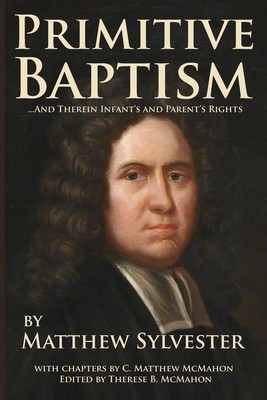
- We will send in 10–14 business days.
- Author: C Matthew McMahon
- Publisher: Puritan Publications
- ISBN-10: 1626633436
- ISBN-13: 9781626633438
- Format: 15.2 x 22.9 x 0.6 cm, minkšti viršeliai
- Language: English
- SAVE -10% with code: EXTRA
Primitive Baptism and Therein Infant's and Parent's Rights (e-book) (used book) | bookbook.eu
Reviews
Description
Matthew Sylvester (1636-1708) was a nonconformist divine, a meek and spirited Reformed preacher, and scholarly linguist.This rare work by Matthew Sylvester is an exegetical triumph of proper hermeneutics. He begins his treatment of baptism and its implications for parents and infants by first setting down a key principle of hermeneutics. He follows closely Christ's perfect method of interpreting the Scriptures against the Sadducees and their denial of the resurrection. Christ uses the Old Testament Scriptures to refute the Sadducees' denial of a "plain" text that taught the resurrection (as many do in the New Testament about infant baptism). Christ accuses them of both erring in their understanding of the Scriptures, and the implications of denying the power of God.Next, Sylvester treats methodically the Hebraisms that are used throughout the New Testament. He responsibly exegetes "house," "household" and other Hebraic terms that have been outlined in the New Testament referring to those having been baptized, and what those terms literally mean, as well as all their implications. He explains such Scriptures as the account with Lydia, "And when she was baptized, and her household, " (Acts 16:15), as well as the accounts of the Jailor and Crispus, among others. As a consequence of that part of the study, Sylvester then teaches the further implications of both an infant's and parent's right in the church in the sacrament of baptism. He explains two different practices; withholding baptism from infants of baptized parents, and withholding such parents from their infants in baptism. Sylvester maintains that the arguments brought against these practices, are those refuted by Christ against a practice of the same nature, namely, that it is a "putting asunder" those whom God has joined together; and that "from the beginning it was not so." His exegetical treatment of this line of reasoning is penetrating and helpful to the inquirer of these important covenant concepts.This is not a scan or facsimile, and has been updated in modern English for easy reading. It also has an active table of contents for electronic versions.
EXTRA 10 % discount with code: EXTRA
The promotion ends in 22d.12:33:46
The discount code is valid when purchasing from 10 €. Discounts do not stack.
- Author: C Matthew McMahon
- Publisher: Puritan Publications
- ISBN-10: 1626633436
- ISBN-13: 9781626633438
- Format: 15.2 x 22.9 x 0.6 cm, minkšti viršeliai
- Language: English English
Matthew Sylvester (1636-1708) was a nonconformist divine, a meek and spirited Reformed preacher, and scholarly linguist.This rare work by Matthew Sylvester is an exegetical triumph of proper hermeneutics. He begins his treatment of baptism and its implications for parents and infants by first setting down a key principle of hermeneutics. He follows closely Christ's perfect method of interpreting the Scriptures against the Sadducees and their denial of the resurrection. Christ uses the Old Testament Scriptures to refute the Sadducees' denial of a "plain" text that taught the resurrection (as many do in the New Testament about infant baptism). Christ accuses them of both erring in their understanding of the Scriptures, and the implications of denying the power of God.Next, Sylvester treats methodically the Hebraisms that are used throughout the New Testament. He responsibly exegetes "house," "household" and other Hebraic terms that have been outlined in the New Testament referring to those having been baptized, and what those terms literally mean, as well as all their implications. He explains such Scriptures as the account with Lydia, "And when she was baptized, and her household, " (Acts 16:15), as well as the accounts of the Jailor and Crispus, among others. As a consequence of that part of the study, Sylvester then teaches the further implications of both an infant's and parent's right in the church in the sacrament of baptism. He explains two different practices; withholding baptism from infants of baptized parents, and withholding such parents from their infants in baptism. Sylvester maintains that the arguments brought against these practices, are those refuted by Christ against a practice of the same nature, namely, that it is a "putting asunder" those whom God has joined together; and that "from the beginning it was not so." His exegetical treatment of this line of reasoning is penetrating and helpful to the inquirer of these important covenant concepts.This is not a scan or facsimile, and has been updated in modern English for easy reading. It also has an active table of contents for electronic versions.


Reviews